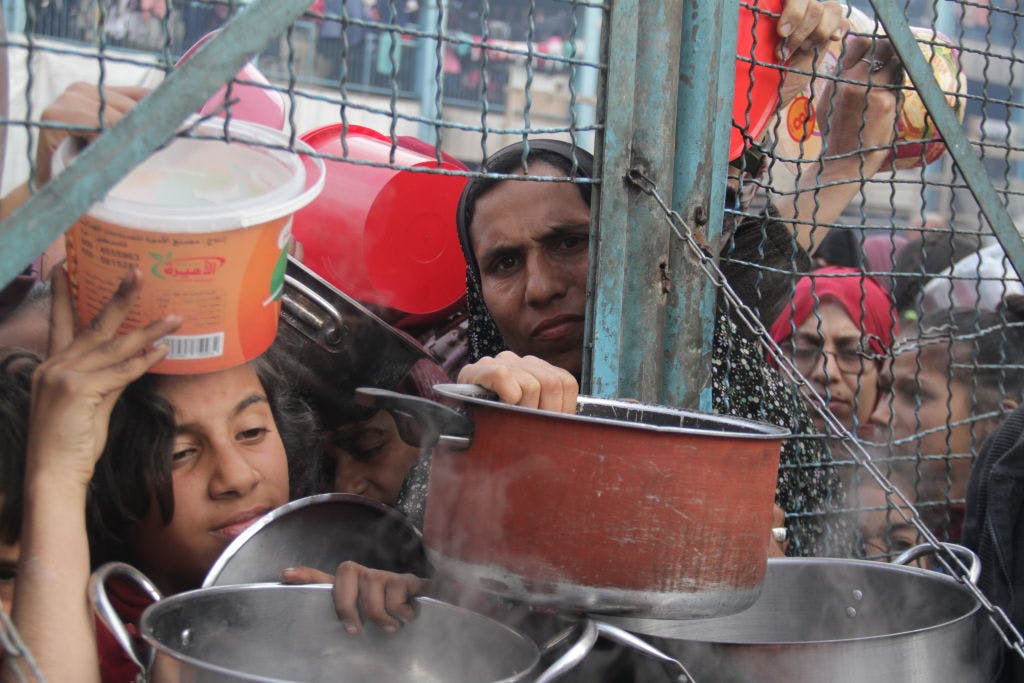Published: 21 March 2024
Last updated: 21 March 2024
The United Nations food agency says famine is imminent in northern Gaza, where an estimated 70% of the remaining population faces catastrophic hunger.
The World Food Program has classed northern Gaza as at Level Five, the worst level in its Integrated Food Security Phase Classification, or IPC — an international process for estimating the scale of hunger crises.
Only about 210,000 people remain in northern Gaza; most of the population fled south following Israel Defence Force warnings in the early days of the war.
But the World Food Program has also warned that if Israel broadens its offensive to the packed southern city of Rafah, the fighting could drive around half of Gaza’s total population of 2.3 million into catastrophic hunger.
The UN secretary general, António Guterres, called on Israel to give immediate and unconditional access to Gaza for aid via land. “I call on the Israeli authorities to ensure complete and unfettered access for humanitarian routes throughout Gaza,” he said before a meeting with the European Commission’s president in Brussels.
Although Israel last week promised to flood Gaza with humanitarian aid and there have been major new aid initiatives over the past two weeks, aid groups say they still face a burdensome Israeli process to import humanitarian aid.
Protestors at the Kerem Shalom and Nitzana crossings are attempting to prevent the entry of aid into Gaza from Israel.
Inside Gaza, relief convoys frequently do not make it to their intended destinations, especially those in the north. They are looted en route, both by armed gangs and by desperate civilians.
Rafah invasion on a knife edge
Israeli Prime Minister Benjamin Netanyahu has agreed to send a team of Israeli officials to Washington to discuss a prospective operation in Rafah with Biden administration officials.
White House national security adviser Jake Sullivan said President Biden had urged Netanyahu in a call this week not to invade Rafah, where about 1.5 million displaced Palestinians are sheltering.
Israel argues invading Rafah is necessary to eliminate Hamas but the Biden administration has rejected this argument.
“The president has rejected, and did again today, the straw man that raising questions about Rafah is the same as raising questions about defeating Hamas,” Sullivan said on Monday.
“That’s just nonsense. Our position is that Hamas should not be allowed a safe haven in Rafah or anywhere else, but a major ground operation there would be a mistake. It would lead to more innocent civilian deaths, worsen the already dire humanitarian crisis, deepen the anarchy in Gaza and further isolate Israel internationally.”
Hostage negotiations resume
A major Rafah military operation would also make it difficult to continue hostage talks US Secretary of State Antony Blinken warned on Tuesday.
In a note of hope, Israel and Hamas have returned to the negotiating table in Qatar, to attempt a deal for the release of Israeli hostages in exchange for Palestinian prisoners and a temporary ceasefire in Gaza.
The proposal being negotiated could lead to a six-week ceasefire in Gaza and to the release of 40 hostages — women, female soldiers, men over the age of 50 and men in critical medical conditions — in return for hundreds of Palestinian prisoners.
Qatari Foreign Ministry spokesman Majed Al Ansari told reporters he was cautiously optimistic about a deal but it was “still too early to claim any particular success.”
But he said if a Rafah invasion goes ahead it “will have a very serious bearing on the talks”.
READ MORE
Headed to north Gaza, aid trucks face gauntlet of armed looters and starving civilians (Times of Israel)
Netanyahu agrees to send Israeli officials to Washington to discuss prospective Rafah operation (AP)
Israel and Hamas start detailed hostage negotiations for first time in months (Axios)
Qatar warns major Rafah operation would harm hostage talks (Jerusalem Post)





Comments
No comments on this article yet. Be the first to add your thoughts.